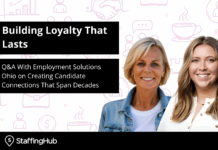
By Lesly Cardec, SVP ClearEdge Recruiting and Marketing
We’ve all been there. We apply for a job, get connected with a recruiter, start going through the interview process, and then… crickets. I’ve been in the industry long enough to know this zone of silence is not necessarily the recruiter’s fault, but it’s frustrating for candidates nonetheless.
The decision to change jobs or switch careers is significant. It’s someone’s livelihood and impacts their life trajectory, family, and other priorities. In many cases, people are considering multiple different career options and juggling what each means both logistically and emotionally. Knowing which options will pan out and which ones won’t is critical.
Recruiters’ jobs are filled with pressures too. They may be working to fill hundreds of requisitions for multiple employers who have hundreds of people applying for each job. Keeping all of those balls in the air while catering to the individual needs of candidates is no easy task.
But at the end of the day I am an optimist who believes in people. I think both recruiters and candidates can have positive experiences by embracing and by formalizing candidate care.
What is candidate care?
The idea of candidate care isn’t a new one. It’s essentially how you treat candidates throughout the hiring and onboarding process. However, some of the basics of candidate care continue to fall by the wayside, such as keeping them abreast of where they are at in the process, providing guidance on what to expect and feedback on the outcome.
Candidates tell me they’re being ghosted, subjected to lengthy processes, and required to sit through countless interviews, and they’re generally feeling a lack of communication. An already nerve-wracking process is being compounded because talent feels stuck in limbo and frustrated by a lack of clarity and consistency from employers and recruiters.
On the flip side, I get it. It can be incredibly overwhelming as a recruiter trying to juggle a large number of open roles and the level of coordination and follow-through required for each. Without the right process and automation in place, it can seem nearly impossible to provide the level of high-touch service you know candidates deserve.
However, in our current hiring environment where employers are still competing for top talent, recruiters—and by extension the employers they represent—cannot afford to make candidates feel uncared for. If you do not nurture and communicate with candidates before they start, what should they expect once they are a part of your organization?
5 ways to improve candidate care
At the core of candidate care is the golden rule: treat others the way you want to be treated. Here are some other tips.
1. Be human/Get to know candidates
There are humans on both sides of this equation. The human doing the recruiting and the human looking for a new opportunity. Both have needs, priorities, and constraints. When we get to know each other better, our humanity is revealed. We feel closer, which can make us kinder and more compassionate, and want the best for each other.
If your relationship is only a set of anonymous messages back and forth, it becomes transactional. Take the job out of the conversation when you first meet. It is about them, not you or the job. Learn more about each other by getting to know them just like you would a new colleague or acquaintance. Understand what inspires and motivates them.
2. Leverage automation tools
Automation is great! It’s a lifesaver for recruiters who work with hundreds or even thousands of applicants. It saves time, creates efficiencies and consistency, and ensures steps don’t fall through the cracks.
On the other hand, leaning too heavily on automation can stifle human connection. Use automation tools for what they’re good for: streamlining the process and removing competitive tasks from your plate in order to focus on the relationship. Think through the candidate journey and where it makes the most sense to have a higher-level touch. Then, plan for automation elsewhere.
3. Communicate consistently
Even if you have no new information, candidates need the reassurance that the process is still moving forward or to understand what may be holding things up. Let them know when they should expect to hear from you next so they’re not left wondering. Remember, a lack of information can lead people to jump to their own conclusions.
One of the biggest frustrations candidates have is they aren’t told when they are no longer being considered for a role. Even if a candidate isn’t the right fit, they deserve to know that so they can move on with their search. This, again, is something that can be automated when it makes sense. However, consider something more personal depending on the situation.
4. Keep the relationship going
You can truly differentiate yourself as a recruiter if you maintain a candidate relationship even after they’ve accepted an offer. The first 60 days are crucial for both a new hire and their employer. Check in with talent and ask them how the onboarding process is going. Schedule regular check-ins: week one, month one, month two, month three, and so on.
Then determine if it makes sense to reconnect every six months or once a year. If talent feels like you are invested in their career and success, they’re more likely to refer you to others.
5. Be a resource
Finally, offer yourself up as a resource to candidates. This is the cherry on top! If you have industry knowledge or experience in the area or roles you place talent in, let them know that. Offer up advice or counsel if they need it. You can also offer to connect them with other resources in the industry.
Doing this makes you memorable. It sets you apart. Having a talent network is critical to a recruiter’s success, and when word gets around that you operate with care, talent will start coming to you.
What goes around comes around
What you put into your relationships with candidates, you’ll see returned back in the form of referrals, new business, and friendships. Employers want to work with recruiters with excellent reputations and deep talent networks, and candidates want to work with recruiters who take the time to get to know them and their career aspirations.
And you never know, that person you helped hire may become your client down the road!
 Lesly Cardec joined ClearEdge in 2020 and is SVP of Recruiting and Marketing. She is responsible for overseeing and activating growth for key accounts. Lesly is also leading the organization’s executive search business line focused on matching senior level marketers to the staffing and HR tech sectors. Prior to ClearEdge, Lesly was SVP of Marketing at Interim HealthCare, a healthcare franchise company, and led the organization’s brand and marketing initiatives, advertising strategies, and public and industry relations to drive growth throughout the franchise network. Before joining Interim HealthCare Inc., Lesly served as Vice President of Corporate PR, Social & Communications for Randstad US. In this role, she was responsible for the strategic direction and execution of Randstad’s social, public relations, communications and thought leadership initiatives including branding, research, surveys, whitepapers and innovative programming for the U.S. market across all brands including commercial staffing, healthcare and engineering.
Lesly Cardec joined ClearEdge in 2020 and is SVP of Recruiting and Marketing. She is responsible for overseeing and activating growth for key accounts. Lesly is also leading the organization’s executive search business line focused on matching senior level marketers to the staffing and HR tech sectors. Prior to ClearEdge, Lesly was SVP of Marketing at Interim HealthCare, a healthcare franchise company, and led the organization’s brand and marketing initiatives, advertising strategies, and public and industry relations to drive growth throughout the franchise network. Before joining Interim HealthCare Inc., Lesly served as Vice President of Corporate PR, Social & Communications for Randstad US. In this role, she was responsible for the strategic direction and execution of Randstad’s social, public relations, communications and thought leadership initiatives including branding, research, surveys, whitepapers and innovative programming for the U.S. market across all brands including commercial staffing, healthcare and engineering.





